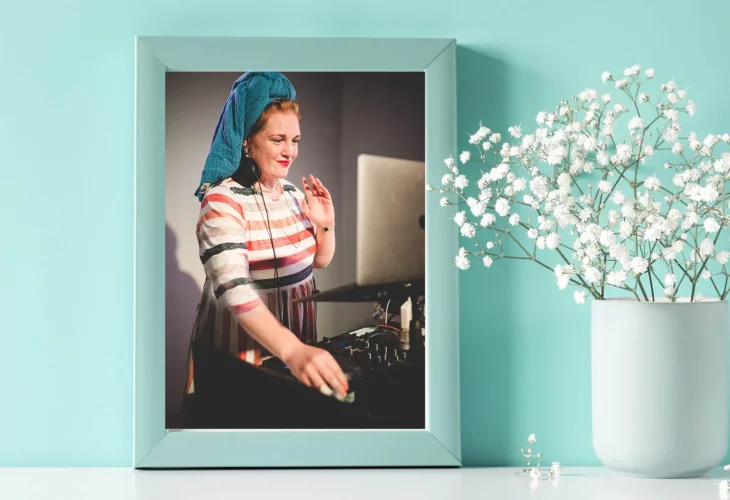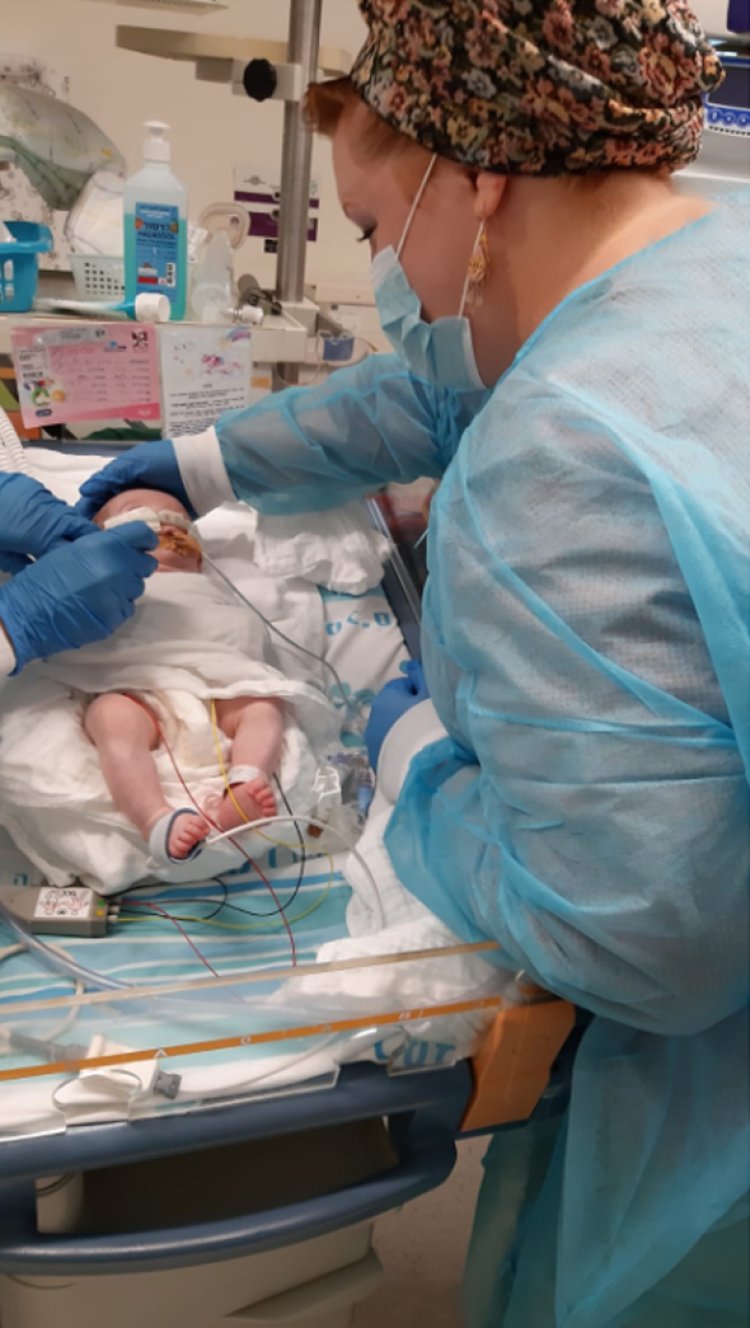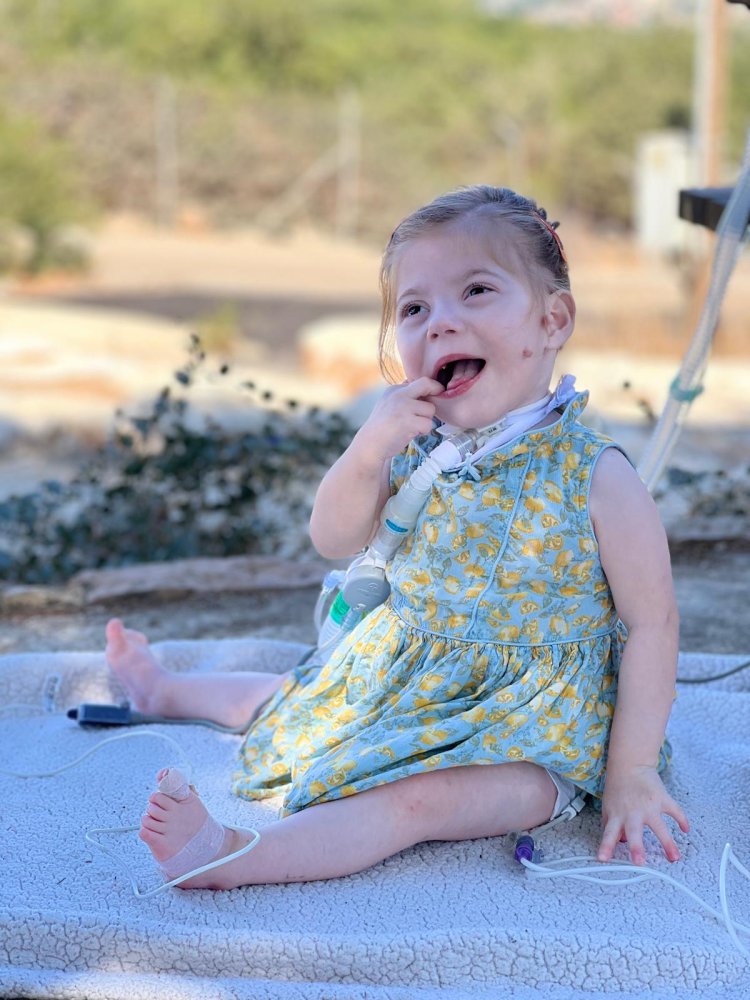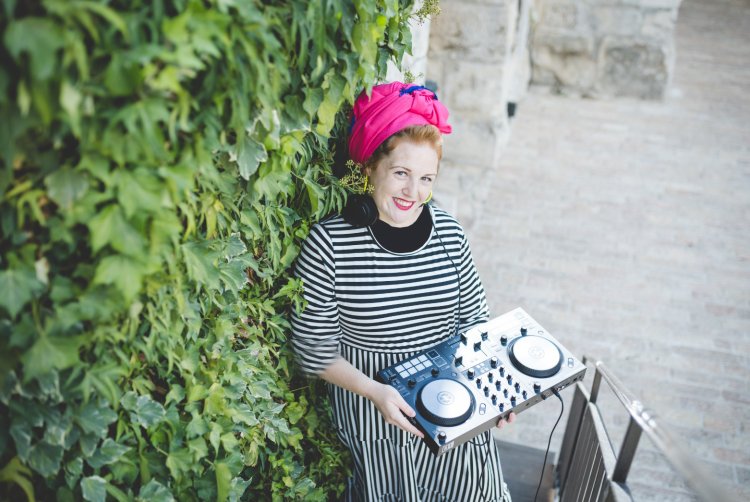Lilach Feldman's Extraordinary Journey: A Family's Story of Perseverance and Joy
After the birth of their three triplets, Lilach Feldman and her husband received shocking news: one of their daughters was diagnosed with a life-threatening syndrome. From that moment, she was hospitalized for nearly two years, as the family remained steadfast by her side. What inspired Lilach to pursue a career in bringing joy to others?
 Lilach Feldman (Photos: Lena Kotni and Anna Geda Levi)
Lilach Feldman (Photos: Lena Kotni and Anna Geda Levi)The moment Lilach Feldman and her husband discovered that they were expecting triplets was nothing short of astounding. It was a moment of complete shock, as they realized their lives were about to change forever. At that time, their eldest daughter was just one year old, and the thought of having four toddlers in the family before she even turned two was overwhelming—diapers, feedings, sleepless nights—all of it filled them with apprehension.
"We were simply worried about the number of children that would arrive," Lilach explains. "It's a kind of worry common to all parents expecting twins or triplets. But in the end, after the triplets were born, and we began to realize that one of the babies had severe medical issues, all the usual concerns faded, and we started to worry about the truly frightening things."

One Month Old and Heading for Surgery
Despite the pregnancy being especially heavy and exhausting, Lilach doesn't recall any exceptional symptoms. "All the check-ups were normal, and everything seemed to be going well," she shares. "Until at 28 weeks, I was hospitalized with concerns of premature labor. I received steroid injections to develop the babies' lungs, just in case they were born early, and ultimately, I managed to hold on until 30 weeks, at which point they were delivered in a very swift surgery."
According to Lilach, it was a cesarean section unlike any other. "The room was filled with a huge team that included the surgeons performing the operation, plus three teams—each responsible for one baby—as well as the head of the NICU. Everyone was there to assist with the delivery. We all breathed a sigh of relief when all three children were born seemingly healthy and needed only initial respiratory support. The joy was immense, and we weren't worried at all.
"I was moved to recovery, my husband went to the NICU, and only after several hours, as I began to recover in the maternity ward, did the deputy head of the NICU come to visit us. He explained that the smallest baby, who weighed only 840 grams, was not okay. She was diagnosed with a relatively common syndrome called 'esophageal atresia.' One in 3,000 babies is affected by this, characterized by an abnormal formation or connection of the esophagus. In our case, the esophagus was severed—the upper and lower parts were disconnected, and the lower part was attached to the lungs."
"It's a very grave danger," Lilach clarifies, "since food could enter the esophagus and become a life-threatening situation. In such cases, surgery is usually performed a few days after birth, followed by a journey of rehabilitation. But with our little one, Levona, who initially weighed only 840 grams and lost even more weight in a few days, it was clear she wouldn't survive such an operation.
"Ultimately, it was decided to wait until she reached a weight of two kilos before operating. Those were very tense days for us, with Levona slowly gaining weight. However, once she reached a kilo, the doctors showed us that they had suctioned a green substance from her lungs—juices rising from the stomach into the lungs. They explained to us: 'The surgery is very risky at her current weight, but if we don't operate, she won't have lungs left.' So, we had to proceed with the surgery when she was only a kilo. The operation was extremely complex and challenging, with the doctors admitting they had never operated on a child this size. By a miracle, Levona survived, and the doctors reported they couldn't repair the esophagus but managed to block the pathway between the stomach and lungs with 'clips.' This allows us to wait safely until she gains more weight to attempt another surgery later. "Levona faced more tough days, recovering slowly from the surgery, enduring terrible hardships, and on some days, we felt we were standing right on the edge of death," Lilach describes.
And what about the other two babies during this time?
"They, too, were in the NICU during that period. Initially, they required short-term respiratory support and also suffered from intestinal infections, but apart from that, they were okay and progressed as expected. At home, as you recall, we had a one and a half-year-old we needed to take care of. Initially, I envied parents who were in the NICU with just one baby, able to devote themselves entirely to him, while I had to leave the triplets at 3 PM to pick up our oldest from daycare, take her to the playground, bathe her, and simply be a mom. Eventually, I realized we needed to say thanks to Hashem for giving us a sort of anchor—a healthy child at home, whose presence allowed us to momentarily escape the chaos and breathe."

The Kids Saved Us
Two and a half months after the birth, the two older babies were released home, while Levona remained in the NICU. "It was incredibly challenging," Lilach describes, "especially since my husband had to keep working during those days to support the family. Levona's condition was not encouraging, as the clips separating her esophagus and lungs had slipped. She underwent another surgery, followed months later by an even more complex and prolonged 14-hour surgery in which doctors finally managed to connect her esophagus. It was a great miracle and cause for celebration."
If one might think that Levona's condition would improve and she would soon go home, Lilach recounts that this was far from the case. "At one point, they discussed her release, but then Levona had a severe collapse, and it was decided not to wean her from the ventilation and to keep her in the hospital for now."
Levona was not ready for home release, so she was transferred to the rehabilitation hospital "Alyn" in Jerusalem for continued rehabilitation. The Feldman family found themselves confronting a new battle, now with a "big" daughter nearly three years old, two 18-month-olds, and Levona hospitalized an hour and a half away. During those intense days, Lilach gave birth to her fifth son.
"I know you'll ask about the stress because it truly sounds impossible," she quickly notes, "but the truth is, the healthy children are the ones who saved our sanity, and it's hard to express how much. They brought us so much light, and the opportunity to go through the development stages with a healthy baby, thank God, who progresses well, was genuinely a type of healing. It made me feel again that childbirth and raising babies can be healthy, good, and joyful.
"By the way, the baby was born in Jerusalem because I was nine months pregnant with Levona already in the hospital, and when he was just a week old, I began bringing him with me to visit her every day, simply spending time with both of them together."
Levona was finally released home when she was one year and ten months old, and the family celebrated the triplets' second birthday together at home.
"Looking back at what we've been through, I myself find it hard to believe," notes Lilach, "because it truly seems inconceivable. It's clear to me that if we had been told this was the path we would take, we wouldn’t have believed we had the capacity to handle it. But that's exactly the kindness Hashem showed us—He didn't reveal what's ahead of us, but let us get through it day by day, just surviving the situation and having faith that better days are coming."

Bringing Joy to Life
But there's more to Lilach's story. "Levona is currently at home, but she's still significantly delayed in her development," she explains. "People need to realize that for almost her entire first year, she was ventilated and often sedated. Essentially, she began developing at a substantial delay. Not to mention that she still isn't breathing self-sufficiently at all, and as a result, is connected to a ventilator all day—this also hinders her development."
"Today, she spends time daily at a rehabilitative daycare with many other special children like her. Thank God, we see improvement, and she's developing and happy. Meanwhile, my husband and I have become a bit like 'nurses' in our profession, as we have to manage ventilator connections, feedings, etc., day and night. We are now preparing to fly abroad for a major, complex surgery in the US, where doctors intend to clean her lungs so she can depend less on ventilation. As a result, we hope she'll gradually be able to eat, and with Hashem's help, this will improve her overall development. We believe in this and anticipate it."
Alongside raising five children, Lilach decided over the past year and a half to take care of herself as well. "After two years where I was fully focused on the kids, predominantly living with Levona and facing mortality daily, I felt that when Levona started attending the rehab daycare, the coming year should be my recovery year—for both body and soul, and primarily, to bring joy into my life.
"I accomplished this in various ways—I began with rehabilitative Pilates training, consulted a nutritionist, and with guidance, started eating right, losing 55 pounds over the year. Then came the career aspect, as I really wanted to fulfill myself, but knew I needed a profession that would allow me to be with a sick child at home—and more than anything, I wanted a joyful career because I was tired of constantly seeing grief and hardship."
"So, I decided to learn DJing with DJ Miri Patel, and after 12 lessons, I embarked on my professional path. Today, I have the opportunity to work as a DJ at a wide variety of events, from bat mitzvahs to challah-baking evenings and soldier wives' parties to Torah study celebrations in honor of the month of Adar. I truly feel fortunate to have the job of 'bringing joy to people,' and the amazing thing is that it ultimately brings joy to me as well."
Is this true happiness?
"Yes, it's the truest and deepest happiness there is. Yes, I have a sick child at home, and no one knows what her future holds, and yes, sometimes I leave for an event feeling sad, tired, and it's hard for me, but I clearly understand that my role is to muster a sense of joy, because I am the energy conduit for the event, and if I don't bring joy, what kind of event will it be? In the end, it just works, and nothing stops me. When I return home and move through the children's beds, I always stop by Levona's, feeling confident she's joyful too."
Please increase prayers for the complete healing of Levona bat Lilach Ruth, among all the ill of Israel.

